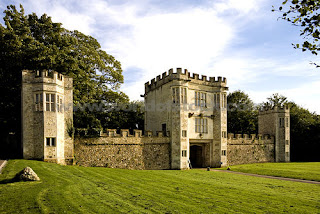
Please ignore the picture. Me and Tom are off for an I Capture The Castle weekend in this Landmark Trust property in about two hours, and I'm too excited not to mention it. The brochure even recommends sitting in the kitchen sink to watch the deer.
Way back in October, the awfully patient Jon M asked:
I know there are as many ways to write as there are authors probably but I was curious about something you mention on your website about writing key scenes and then 'filling in the gaps.' Is this a particularly useful approach?
One of the most valuable things I learnt from my MA is that there really are as many different ways of writing as there are people, and perhaps books. Some of my coursemates would plan everything meticulously, others never planned at all. Some wrote three times as many words as they needed and then edited ruthlessly at the end, others worked over each chapter until it was perfect before moving onto the next.
I tend to have a very simple, overarching plot. Then I start thinking of scenes that should go within that. Sometimes these are the key scenes, sometimes I just wake up and think 'There should be snow in this book!' and write that. Often I'll know where in the book these scenes fit, but sometimes it's as vague as 'somewhere near the end' and sometimes I'll have no idea.
I started writing like this because Ways to Live Forever is full of lists and pictures and stories, most of which are important to the plot, but most of which I couldn't place in a larger narrative until I'd ... er ... written one. I found it a wonderfully liberating way to write. There's nothing worse than getting your character home from their battle and realising you have no idea what they do next. Or worse, you end up describing all the dull bits - them taking off their shoes, washing the blood out, eating toast.
Just writing the fun scenes means that I enjoy writing more - if I want to write something sad, or something funny today, I write it. It means that often when I come to piece the scenes together, I realise I don't need the connecting chapters - which makes for a much more interesting, more tightly paced novel. It means that when I come up with a subplot six months in, I can write all those chapters without too much worry. Often I'll write the ending first, so I know where I'm heading. I can discover what I want to write as I go along - and I can avoid writing the difficult sex scenes, for example, until I'm comfortable enough with my characters to be able to do them well.
This approach does lead to a certain type of novel, which I like, but you may not. It means that I write a lot of chapters which don't make it into the final book (although again, I like this, as it gives me permission to be experimental and also, I think, makes it easier to edit the book. I can simply delete the whole chapter, or delete it and rewrite it from the start). It also makes sewing all the pieces together at the end an absolute nightmare. I put them all in an approximate order, read them, weep and wail, delete several thousand words, rearrange them, read it again, weep and wail again, realise I've forgotten to put in a scene introducing Granny, introduce Granny, rearrange again ... I have to spend a long time at the end making sure the thing is paced right, that all the important information is given and that the shifts in tone all work. Sometimes I do end up writing filler scenes - one example of this is the chapter 'Alone in the Night' in Ways to Live Forever, which I wrote to cope with a jump from one difficult scene to another, the next day, with a completely different emotional tone. In Season of Secrets, I ended up writing a lot of chapters with titles like 'November' to cope with the passing of time. It does finally come together, though - I got my bound proof of Season of Secrets through yesterday (hurrah! hurrah!), and was surprised to discover how much I liked the finished product.
This way of writing suits the way I tell and find stories. It works for me. It may not work for you. Why don't you try it and see what happens?
new posts in all blogs
.jpg?picon=1806) By: Sally Nicholls,
on 11/28/2008
By: Sally Nicholls,
on 11/28/2008
Blog: An Awfully Big Blog Adventure (Login to Add to MyJacketFlap)
JacketFlap tags: writing, questions, Sally Nicholls, MA in Writing for Young People, landmark trust, Add a tag
Viewing: Blog Posts Tagged with: MA in Writing for Young People, Most Recent at Top [Help]
Results 1 - 1 of 1
Blog: An Awfully Big Blog Adventure (Login to Add to MyJacketFlap)
JacketFlap tags: writing, questions, Sally Nicholls, MA in Writing for Young People, landmark trust, Add a tag
1 Comments on Answers to Questions - Part Two - Sally Nicholls, last added: 11/28/2008
Display Comments
Add a Comment



Well worth being patient for! Thankyou so much Sally. I'm going to try this as it may suit my own way of working which involves culling thousands of words anyway! I like the idea of writing the fun scenes first...think it's the word 'fun' that appeals to me! Thanks again. Hope the castle is all beer and skittles.